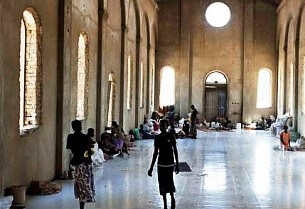Download: Partnership Note: On Faith-Based Organisations, Local Faith Communities and Faith Leaders
The resource was launched at the UNHCR-NGO Consultations in Geneva, in June 2014, at a well-attended Side Event with speakers from the Anglican Communion, Islamic Relief Worldwide, the World Council of Churches and UNHCR, who discussed their experience of working as or with faith-based organisations in refugee communities.
Partnership between the UNHCR and faith-based organisations has been described as a ‘journey of mutual discovery’, which has involved sharing the experiences of those faith-based organisations, which may be present in emergency situations which are unreachable to international agencies.
Local faith communities often provide the first response to a developing emergency. They usually have a profound understanding of the protection needs of refugees and displaced people and can provide enduring support after the international agencies have left or in places where they are unable to work.
UNHCR has worked with faith-based organisations since its creation in 1950, but the High Commissioner’s Dialogue on Faith and Protection in December 2012 was its first formal multi-faith dialogue. The partnership note was created as a result of this dialogue, which affirmed the important role that faith communities can play in protection.
The Partnership Note is intended as guidance on working with faith-based organisations, local faith communities and faith leaders and sets out the challenges of partnership, examples of good practice, principles to guide partnerships, and practical advice for putting such principles into practice.
At the closing remarks of the Dialogue in 2012, High Commissioner António Guterres underlined the importance of the “valuable contributions that faith organisations and communities make to the protection of refugees and the displaced”.
The collaboration between UNHCR and faith-based organisations has also seen the launching of the Welcoming the Stranger: Affirmations for Faith Leaders at the Religions for Peace World Assembly in 2013. Volker Turk, Director of International Protection at UNHCR, said “All main religious value systems, firmly anchored in cultural and social traditions around the world, contribute to asylum and protecting the other, both in law and in practice.”
The Archbishop of Canterbury, Justin Welby, signed the Welcoming the Stranger document in November 2013. He also wrote on his blog: “There is an urgent need for international humanitarian agencies and local religious groups to work more closely together to help those who are suffering. It was very encouraging to see religious leaders launch a document reaffirming their commitment to refugees – and I hope and pray that this commitment grows stronger. As Christians, now more than ever, we must be ready to offer the love of Christ to all those enduring the tragedy of being a stranger.”
Many Anglican churches around the Communion are involved in supporting refugees. The Anglican Church in Zambia and Burundi are currently working as part of the Anglican Alliance to research and develop resources to help local church leaders and communities to understand and respond to the particular needs of refugees with disabilities.
Article contributed by James Draper, Assistant to the Anglican Communion Representative to the United Nations institutions in Geneva.
Photo credit: © UNHCR / A. Zevenbergen

